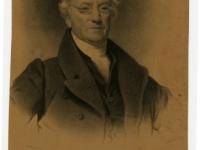Answer: William Rawle
William Rawle (1759-1836) was involved in the creation of many of the United States’ new institutions. He was the first president of the Historical Society of Pennsylvania, a member of the Pennsylvania Abolition Society in its infancy, and the founder of Rawle and Henderson Law firm, now recognized as the oldest law firm in the nation. Unexpectedly, he grew up in a wealthy Loyalist Quaker household that made his story of discovering a deep love for America an interesting journey.
William was only two years old when his father, Francis Rawle, died. His mother, Rebecca Warner Rawle Shoemaker re-married Samuel Shoemaker, mayor of Philadelphia from 1769-1770, a few years later. Typical of prosperous families, they spent their summers at Laurel Hill, now part of Fairmount Park and still open to the public. A country retreat was normal for people of their status and the area offered a safe haven for the rich of Philadelphia to have the opportunity to escape the heat and disease of the city.
As Quakers, the family remained neutral at the Revolution’s outset until the British occupied Philadelphia. At that time Samuel Shoemaker decided to join the occupation by helping with law enforcement in the City. Once the British fled, all known loyalists were convicted of high treason giving Samuel no choice but to leave Philadelphia for New York, and he took William with him.
Sailing first to New York, and eventually to England, William kept a diary of his travels and wrote letters often. He refrained from stating his political views during this period and mentions only that he left due to his sense of filial duty. While in England, William studied law at Middle Temple, and his writing illustrated his frustration over the lack of equality in England. He disapproved of the emphasis of rank and birth over merit and skill; his writing consistently noted his preference to the equality enjoyed by Americans. He wrote about this disappointment frequently and decided to return to the US in 1783.
Upon arrival, William joined “The Society for Political Inquiries,” where he discussed politics with revolutionaries such as Benjamin Franklin, Benjamin Rush, and Thomas Paine. The minutes of their meetings are still held here at HSP. During the drafting of the US Constiution, he subscribed to the federalist ideas, arguing for a strong central government. His writing, “A View of the Constitution of the United States,” is still studied by law students. Rawle even hailed George Washington as an admirable man and was appointed by Washington to the position of US attorney for Pennsylvania.
In addition, Rawle devoted the rest of his life to preserving the history of America and upholding the law in Philadelphia. Through his time as an attorney and participation in the Pennsylvania Abolition Society, he fought for equal rights for both Native American and African Americans and he maintained his Quaker religion until his death in 1836. During his inaugural address to the Historical Society of Pennsylvania, he asserted that the institution would not hold an “apathy to progress” rather he wanted “no opportunity to be lost” in preserving the past for the benefit of future generations.
If you wish to visit Laurel Hill, the summer home of William Rawle, please visit laurelhillmansion.org for a list of events or just stop by Thursday-Sunday 10am-4pm.

